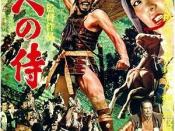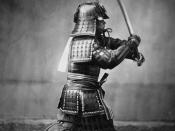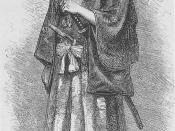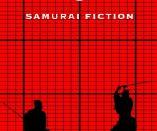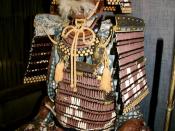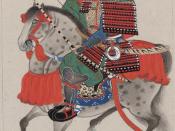Final Draft I.S.P In the novel The 47 Ronin by John Allyn, and in the film The Seven Samurai directed by Akira Kosagowa. The viewer of both can see at least two similarities and differences in the impact of conflicting societal values on the major characters in the novel/film. In this case, both the film and novel deal with the samurai's code of honor. In this code of honor, a samurai is expected to die an honorable death, be loyal to their masters and always be expected to face uncertain able adversities, in short, to have courage. Though the main character(s) in both novel and play are "Ronins"ÃÂ, which makes them still follow they way of the samurai's code of honor, it soon becomes apparent that they decide to go against their code of honor by ignoring their code and do what they believe is the right thing to do.
Primarily the theme of how honor and loyalty prevails above all can be seen in both the novel and film. For instance, in the novel, the first example of conflicting societal values can be seen when the main character Oishi, decides to revenge his master's death by swearing to kill the man held responsible. This act of revenge is strictly prohibited under the Shoguns rule, but Oishi is willing to face the consequences in order to glorify his master's death. Fortunately, Oishi is not alone; along side with him are his fellow clansmen who are also willing to take such a sacrifice in order to avenge their master's death. Another factor, which makes this situation conflict with their societal values, is because their affiliated clans feel that they will lose face if such an event were to happen. On page 67, Oishi says, " We may live, we may die, but in the end, our master will be glorified."ÃÂ Here we see how the theme of loyalty and honor come into play. The quote shows how even though there are many reasons as to why they should not go through with this plan; they feel that loyalty to their master is much more important.
Similarly, in the film, the main characters are hired by farmers to fight against an arm of bandits that had recently raided their village by taking their crops and women. The film shows the societal values of the seven samurai's willing to fight for people that they don't even know for a small reward of three meals. The conflict shown here is that even though being ronins (master less samurai's) the seven samurai shouldn't accept such a challenge mainly because it is way below their standards as samurai's, but more importantly because samurai's have a much higher rank than a farmer, there for while being a samurai, working for a farmer would be considered ridiculous. An example of this is seen while the farmers try to recruit the samurais to fight. One samurai reply's " I might be pore, but I'm not ready to beg yet"ÃÂ and kicks the farmer down. This quote shows how as a samurai, even being poor, working for a farmer is the last resort. The seven samurai that did end up accepting the challenge are the ones who are really conflicting with their societal values because they did accept the offer and go against their honor. Although it seems that the film and novel have a lot in common on the surface, it is more important to note that underneath the surface there are conflicting ideas that are in both the novel and film which deal with the fact that they both have their main characters going against their master's death and going against the Shogun, or simply helping the needy farmers in their desperate time of need even though it is considered the lowest of all lows to help farmers at the ranking of a samurai.
Another example of how the novel and film show the conflicting values in the ways of the samurai's are shows in the form of humor. In the novel, the main character Oishi tries to trick the spies whom have been following him since the day of his master's death into thinking that he is routinely going into teahouses and getting drunk.
As a samurai, one is to never drink too much and make himself look like a fool. Oishi does this intentionally to trick his spies into thinking that he is no longer a threat. Fortunately for Oishi, he gets himself into a fight and messes around with another samurai. By doing this, he is sure that his spies are confident that he is no longer become a threat to the man who Oishi has sworn he would kill. On page 108, Oishi tells himself " If it weren't for those retched spies, I would have killed that man instantly, but it couldn't have come at a better time"ÃÂ. This quote shows how Oishi has done what he did in order to preserve his plan on revenging his master's death. If he weren't under such circumstances, he would have slain the man with his sharp blade. In the film however, the main characters conflicts his societal values in a different manner. Instead of acting like a drunken fool, this main character acts foolish in the attempts of acting brave. During the battle in the villager's town, the samurais become aware of the enemies gun. The foolish samurai acts upon his own merits after being told to no leave his post and kill the man with the gun because it wasn't worth the risk but he believes that he must do this and decides to take out on of the gunmen himself by sneaking up on him. Although his tactics was very smart, and did retrieve the gun, he finds out later that it was very foolish of him to have left his post. The enemy ended up entering the base from his entrance, which wouldn't have happened if he had just stood his post. The leader of the samurai's then tells him that he was stupid to have left his post. Then the leader raised the question to the foolish samurai " what if you died??"æDid you think of that?"àThe foolish samurai then replies " If I did"æthen it would have been in honor"ÃÂ. He is quickly interrupted by the leader who then says,"àThere is NO honor in dying in an act of foolishness. Its cowardly!"ÃÂ. The foolish samurai realizes his stupidity but also acknowledges the fact that his stunt was worth the risk, because he did take out on of the gunmen. The importance of this scene shows how the foolish samurai even though knowing the consequences still decided to retrieve the gun. In both cases of the novel and film, the two main characters knew what they were doing was wrong, but still decided to go through with it because they believed that it was the right thing to have been done, aside from knowing their code of honor. Whether it was just acting drunk and making a fool of himself or trying to retrieve a gun after knowing the consequences of the attack, it still proves that in the end, in their hearts, they believe that what they did was the correct thing to do even if it was directly disobeying the samurai's code of honor.
Finally, the theme of respect plays a big deal in the Japanese culture and in the novel and film. During the novel, Horab, who is Oishi second hand man, disrespects Oishi because he thinks that Oishi has become careless and drinks too much.
As a samurai, one should not drink too much, but Horab has done worst, he has disobeyed his master and Oishi by taking matters into his own hands. Horab's character is very eager to fight, and is almost always respectful to his master's but his rage had clouded his judgment and has blurred his vision from the big picture. Instead of waiting for Oishi's to make the call for the attack, Horab decides to call a meeting and claim leader of the 47 samurai's. Luckily for Horab, Oishi shows up and tells them the full story and why he acted like a drunk. On page 148, Horab comes barging in and says, " So it is true"æyour nothing more than a drunk. You actions leave me and the others no choice but to go on with the plan without you"àand before Oishi could reply, he left. This shows how Horab was quick to judge his long time friend and leader. Not only did he not leave his master a chance to prove him self, but also went against him by claiming leader of the other samurais. In Japanese culture it is very wrong to disobey your leader. Fortunately for Horab, Oishi was well aware of where Horab was coming from and accepted his apology after he told the full story. Coincidently, the film has a similar ordeal. As the seven samurai's arrive in the village, they are not greeted by any of the farmers. At first, the seven samurais are very mad considering they are the ones who will be fighting for them. The reason why the farmers don't show their faces is because they are afraid of them. In order to get them to show their faces, the comic relief character, which is also the foolish character in the previous example, decides to sound the noise, which is used to signal the farmers that bandits are coming. As he does this, the farmers come flooding out of their huts frantic. Once the farmers realized that it was a false alarm they get a little mad. The foolish character however, begins to list points as to why he did what he did. He says " How is it that without any bandits, we receive no sign of respect, whereas once you hear bandits are coming, you all flea to us as if we were gods?"àThis example clearly shows how the farmers show disrespect towards to samurais by not greeting their guest with food and tea. Later on in the movie, we see that the farmers begin to serve their finest food to the samurais after they encounter three of the bandits. Both of these examples show how important respect is in the Japanese culture, and that one should always show a sign of respect whether it's thinking that your leader and friend has become a drunk, or by greeting your guest with tea and food instead of hiding away like cowards and there fore showing a sign of disrespect.
In the way of the samurai, it is essential to never die without honor, be true and loyal to your master, and to have courage in battle. All of these societal values of the samurai have been gone against by the main characters in both the novel and film. The point to recognize here is that the main characters went against their beliefs/ societal values only because the believed that their action was justly caused. In the novel, the main characters go against their beliefs as a samurai only to preserve the most important value as a samurai which is the always be loyal to their master. Similarly in the film, the main characters chose to help out needy farmers in their time of need despite their values because they believed that it was the right thing to do. In the end, all the characters in both the novel and film have chosen to go against their beliefs in one way or another, but more specifically they did their actions only in their hearts it was the right thing and the only thing to have done.
